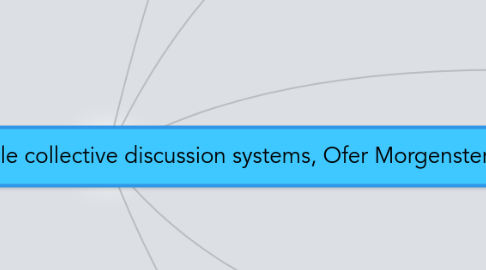
1. Collective discussions
1.1. Researching & making decisions on challenging questions collectivly
1.2. Process
1.2.1. ..
1.3. Characteristics
1.3.1. Network of
1.3.1.1. questions
1.3.1.2. ideas
1.3.1.3. arguments
1.3.2. No limitation on # of participants
1.3.3. Not same place, same time
1.3.4. Async parallel activity
1.3.5. Anonimity
1.3.6. Agenda growing from the discussion
1.4. Applications
1.4.1. The global brain
1.4.1.1. solutions for global problems
1.4.1.1.1. eg, global warming
1.4.2. Citizen agenda formulation in democracies
1.4.3. Thkinking & decision making in organizations
1.5. Examples of systems
1.5.1. Idea management systems
1.5.2. Argumentation systems
2. Information overload
2.1. Cognitive state when the information processing requirements exceed the individual processing capacity
2.2. limited attention resources per individual
2.2.1. once drained, individual ceases to be effective
2.3. Collective discussion is a complex activity requiring a lot of attention
2.4. many types of activities
2.5. Symptoms
2.5.1. Emotions
2.5.2. Ineffectiveness
2.5.3. Unoptimal strategies
2.5.3.1. Choosing 1st options
2.5.3.2. Abondoning discussions
3. Focus Theory
3.1. Briggs, 1994
3.2. Factors increasing attention in discussions
3.2.1. Alignment of goals
3.2.2. Minimal distractions
3.2.3. Productivity
3.3. Attentions components
3.3.1. Access to information
3.3.2. Communications
3.3.3. Discussion
3.4. If we make these 3 components more efficient, we increase effectivness
4. Attention management tools
4.1. Roda &al, 2006
4.2. Cognitive level
4.2.1. Filtering tools
4.2.2. Metadta
4.2.3. Flow regulation
4.3. Discussion level
4.3.1. Reminders
4.3.2. Automatic task prioritization
4.3.3. Focus on tasks according to discussion needs
4.4. Operative level
4.4.1. avoid distractions
4.4.2. ..
4.5. Meta-cognitive level
4.5.1. Visualization of attention allocation
4.5.2. Behavior pattern analysis
4.5.3. Agenda tools
5. Their research focusses on:
5.1. Metrics-based Attention management tools
5.1.1. Kilen, 2011
5.1.2. Personal assistance monitoring the discussion & advising the users the next actions to participate in the discussion
5.1.3. Principles
5.1.3.1. Define normative process of discussion, refering to
5.1.3.1.1. Actions
5.1.3.1.2. Norms
5.1.3.1.3. Metrics
5.1.3.1.4. Exceptions
5.1.3.2. Define profile per user with relevant metrics
5.1.3.2.1. interesting to him
5.1.3.3. Provide recommendations during the discussion, based on identifying exceptions, & assisting them to focus their contribution...
5.1.4. Chose the methodology
5.1.4.1. Imen-Delphi
5.1.4.1.1. Goal
5.1.4.1.2. Process
5.1.5. Examples of system recommendations
5.1.5.1. Add questions to categories with less then x questions
5.1.5.2. Add statements to questions with less than x statements
5.1.5.3. Improve statements that others added arguments to
5.1.5.3.1. promote user's intersts
5.1.5.4. add ranking for statements with less than X rankings
5.1.5.5. for statements on which your ranking differs from others, review your ranking & add arguments
5.1.6. UI
5.1.6.1. Items sorted by contribution relevance
5.1.6.2. Recommendations given over the discussion
5.1.6.2.1. promoting both the discussion & your personal interests
5.1.7. Research model
5.1.7.1. Experiment & measure how much the Information Overload is resolved with these strategies
